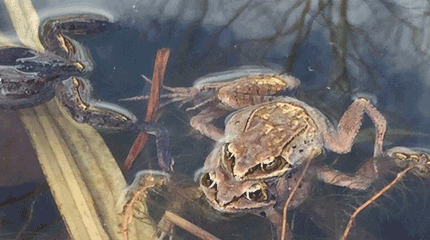
We are in an ephemeral time here at Rolling Ridge, an indefinable season between winter and spring. Our friend Cheryl is repairing her bluebird boxes while patches of crusty snow line the side of the gravel road. Days ago, a bitter wind chilled faces and bones. Yesterday the frogs sang their mating songs and danced in the pond by Deer Spring Creek. Leaves lie brown and crumpled on the forest floor while daffodils cluster greenly around the porch and by the compost bin. Josh and friends prune berry canes and bushes in the garden; a fresh batch of potting soil waits, while the utterly bare branches of the trees overhead remain tangled against the drifting clouds. At night, the stars are brilliant points of light in the still-sharp winter sky. The moon glistens behind high clouds.
One season bleeds into the other; spring is poised behind the scrim of winter. It is bitter and balmy, wet and crunchy, sloppy and breathtaking: an imperfect mess.
I have been thinking about the grace of a certain kind of forgiveness: the resilient, engaged acceptance that happens, as poet David Whyte says, when we "drink from the deep well of things as they are."
On the first weekend of February our community gathered for our annual retreat, a time for deepening connection, for honest conversation about what we each hope for at Rolling Ridge and the hard edges of fitting that with schedule and the limits of time and resources. It was and remains an untidy business.
All around Rolling Ridge now water flows irrepressibly from under the earth, rising up from snowmelt and rain. The creeks and streams spill fast and full over stones and rocks. The sound rushes up from the small valleys, a rich rumbling melody, resonant evidence of the currents and pools that lie far underneath, the hidden flows and eddies that give rise to the tumbled, rushing surface.
The trick is to listen open heartedly for those hidden, unacknowledged melodies and allow others to hear them too; in this way, says David Whyte, "we deepen our understanding, make ourselves more equal to circumstances, more easy with what we have been given or not given." From that wellspring comes the water that finally turns a lingering winter into the spring of forgiveness: First, the essential, difficult self-forgiveness that accepts what we have been given and not given, our vulnerabilities as well as our strengths. From that resilient self-awareness flows the mutual forgiveness that is the life water of community.
Yesterday, Scot sent around an email: "I promise not to overwhelm you with updates of our spring time pond, but here's what's happening now just as winter is ending..." Included were pictures of mating frogs, joyous and colorful. "Yesterday there were a dozen or so, today maybe 75!"
Image by Scot DeGraf